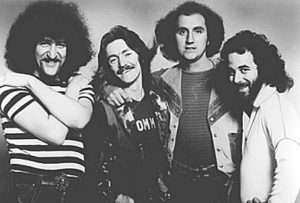Editor’s note: In this installment of EhOR, Jay Kumar looks at the career of Canadian party rock purveyors Trooper.
If you attend just about any professional sporting event in Canada (and many in the U.S.), there’s a good chance you’ll hear at some point a catchy little ditty called ”Raise a Little Hell.” But if you didn’t grow up listening to AM and FM rock stations in Canada during the 1970s, you probably have no idea who the artist is.
The Vancouver act Trooper got its start through founding members Ra McGuire and Brian Smith, who formed the bands Winter’s Green and Applejack, solidifying the lineup with bassist Harry Kalinsky and drummer Tommy Stewart. The band changed its name to Trooper in late 1973 and soon caught the eye of Randy Bachman (Bachman Turner Overdrive, The Guess Who), who signed them to his label Legend.
Trooper’s self-titled 1975 debut garnered the band a couple of Canadian hits, ”Baby Woncha Please Come Home” and ”General Hand Grenade.” The album was filled with good-time blues-rock tunes, but only the singles really stood out as anything out of the ordinary. For its follow-up, Trooper jumped to MCA and added keyboardist Frank Ludwig, as well as an increased emphasis on vocal harmonies. The resultant album, Two for the Show, was released in 1976 and scored Canuck radio hits with the title track and ”Santa Maria.” Kalensky was replaced by Doni Underhill before 1977’s Knock Em Dead Kid, which solidified the band’s standing as rock radio mainstays in Canada. The album went platinum in the Great White North (100,000 sold) and featured the hits ”We’re Here for a Good Time (Not a Long Time)” and ”Oh, Pretty Lady.” It also featured a notable deep cut, ”The Boys in the Bright White Sports Car,” that I remember hearing more than a few times on the radio as a young’un living in the Toronto ’burbs. The song became a hit in Canada a few years later when it showed up on Hot Shots, a greatest hits compilation.
The band’s next album, 1978’s Thick as Thieves, included Trooper’s only U.S. hit, the anthemic ”Raise a Little Hell,” which spent eight weeks on the Billboard Top 100 and got as high as #59. Big chorus, big riff and a rebellious message equals catchy hit, and it has managed to live on at sporting events. The other two hits on this album, ”Round Round We Go” and ”The Moment That It Takes,” were sung by Ludwig. The album went double platinum, as did 1979’s Flying Colors, which featured ”Three Dressed Up as a Nine” and ”Janine” as radio hits. Later in ’79, Trooper released Hot Shots, which featured remixes of songs from the first five studio albums and was a huge hit, going quadruple platinum.
In 1980, Trooper ended up winning the Juno Award (Canada’s version of the Grammy) for Group of the Year, and both of its ’79 releases were nominated for Album of the Year. The band was at its peak. At this point, the band severed ties with producer Randy Bachman and keyboardist Ludwig left to join another band (and replaced by Rob Deans). But with its next release, 1980’s puzzlingly titled Trooper (the band’s second self-titled record), the momentum of the previous five years came to a screeching halt. It might have been that the band was too tied to a ’70s hard rock sound (although that didn’t hurt plenty of other acts) or the absence of Bachman and Ludwig or the fact that the songs just didn’t work, or the fact that seemingly every Canadian rock fan had purchased the greatest hits record released a few months earlier. But other than the pandering ”Real Canadians,” nothing really resonated from the record. For the first time, Trooper didn’t score any top 40 hits from an album. Trooper followed up with 1982’s Money Talks, but it too was a dud. ”Only a Fool” is a piano-driven ballad that got a little airplay on MTV, but it ultimately didn’t do much on either side of the border.
Trooper teamed up with Ludwig again on a tour in 1986, but the band’s next studio album wasn’t released until 1989’s self-released The Last of the Gypsies. The album went gold in Canada and scored hits with ”Boy with a Beat” and ”The Best Way (to Hold a Man).” The band released one more studio album, 1991’s Ten, but it was slightly overshadowed by an album by the same name from some new band called Pearl Jam. The album featured a minor hit in ”The American Dream,” but it disappeared quickly as the rock scene was taken over by younger, less-polished acts like the aforementioned Pearl Jam and Nirvana.
Even though they never released another album, Trooper has continued to tour Canada over the last 25 years. Original members McGuire and Smith still lead the band, which mainly plays summer festival shows and has cemented its reputation as a uniquely Canadian party rock band.






Comments